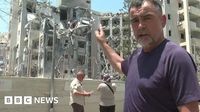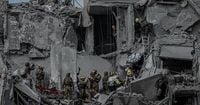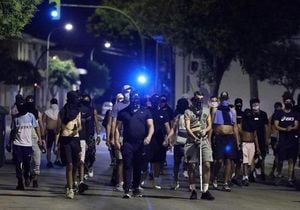In the early hours of Tuesday, June 24, 2025, the southern Israeli city of Beersheba endured a devastating Iranian missile strike that left at least five people dead and more than 20 injured, just moments before a US-brokered ceasefire was set to take effect between Israel and Iran. The missile hit a seven-story residential building, causing extensive damage, including the partial collapse of the structure and destroying two reinforced safe rooms where some residents had sought shelter.
The attack came amid a tense and complex conflict that has seen nearly two weeks of cross-border hostilities, including Israeli and US strikes targeting Iranian nuclear and military sites, and a barrage of Iranian missile and drone attacks on Israeli territory. Despite the ceasefire announcement by President Donald Trump, the missile strike in Beersheba cast immediate doubt on the truce's durability, as further missile launches followed later that morning.
The missile, launched from Iran, struck the residential building around sunrise, tearing through the middle floors and leaving piles of debris. Emergency crews, including firefighters and soldiers from the Israel Defense Forces Home Front Command, worked tirelessly through the day to search for survivors amid the rubble. Rescue workers recovered the fifth victim hours after the initial impact, underscoring the scale of the destruction.
Among the dead were a man and a woman in their 40s and a man in his early 20s, with a fourth individual’s identity yet to be confirmed. Three survivors were pulled from a reinforced security room, known locally as a "mamad," on the building's fourth floor, where they had been trapped beneath the rubble. The rest of the wounded sustained light to moderate injuries, with some treated for acute anxiety.
Magen David Adom paramedic Dvir Ben Ze’ev, present at the scene, described the devastation: "We responded with a large team that included intensive care units, ambulances, rapid response vehicles, and motorcycles. We saw massive destruction along the street where the missile hit. At the entrance to one building, an unconscious man was lying on the ground. After searching further, we found two more victims — a man and a woman — also unconscious. We performed medical examinations, but sadly there was nothing we could do except pronounce them dead." He added, "There was nothing we could do for some of the victims."
The residential building was relatively new and equipped with reinforced safe rooms designed to withstand missile attacks and shrapnel, though not a direct hit from a large explosive warhead. Preliminary investigations by the Home Front Command revealed that the missile directly struck two of these safe rooms, tragically killing those inside. In one safe room, three members of a family died, while a fourth person was killed in the second reinforced room.
The attack was part of a broader pattern of violence on Tuesday morning. Iran fired six missile barrages in quick succession at Israel, targeting the country's center, north, and south. Approximately 20 ballistic missiles were launched in these salvos, most of which were intercepted by Israeli air defenses. In Beersheba, two missiles were fired in a salvo at 5:40 a.m., with one intercepted and the other striking the apartment complex.
The Israeli Air Force responded by striking eight Iranian ballistic missile launchers in western Iran, which were reportedly primed to fire at Israel. The Israeli military released footage of these strikes, stating that they foiled a larger attack. Israeli Air Force fighter jets also hit numerous Iranian military targets in Tehran overnight, deploying over 100 munitions against nuclear project headquarters and weapons production sites.
Despite the ceasefire announcement, sirens wailed again in northern Israel around 10:30 a.m., indicating new missile launches from Iran. The Israeli government vowed a forceful military response to any violations of the truce. Defense Minister Israel Katz instructed the military to respond robustly to Tehran following these renewed attacks.
The conflict, which began on June 13, 2025, with an Israeli military assault on Iran’s nuclear sites, has escalated rapidly. Iran retaliated by launching over 550 ballistic missiles and approximately 1,000 drones at Israel. These attacks have caused significant casualties and damage, with 28 people killed in Israel, including those in Beersheba, and thousands wounded. Israeli strikes on Iran have resulted in 606 deaths and over 5,300 injuries, according to Iran’s health ministry.
The Beersheba strike was one of the deadliest single Iranian attacks since the war began. Other buildings in the same complex, alongside a nearby school and shops, also suffered serious damage. Rescue workers formed human chains to clear debris amid burned-out cars and broken glass. City welfare workers set up a tent outside the school to assist displaced residents, many of whom were immigrants from the former Soviet Union, aided by Russian-language translators.
Residents recounted harrowing experiences. Victoria Shifrin, who lived on the second floor of the struck building, told Israeli Channel 12 that she and her family rushed to their safe room upon hearing sirens. They heard a massive explosion, and the safe room door was blown in by the blast. She described climbing down a destroyed staircase, terrified and shaken, having left with nothing but the clothes she wore.
The hospital system in Beersheba also bore the brunt of the conflict. Soroka Medical Center was treating 10 people from the missile attack, two in moderate condition and the rest lightly injured. The hospital itself had been severely damaged by an Iranian missile strike just days earlier, on June 19, 2025.
International reactions to the conflict have been mixed. While President Trump brokered the ceasefire and urged both sides to adhere to it, the fragile truce has been undermined by ongoing missile launches and retaliatory strikes. Iran’s state media confirmed its participation in the truce, but Israeli officials remain wary, warning of forceful responses to any breaches.
The conflict underscores the deep-rooted tensions between Israel and Iran, centered on Iran’s nuclear program and military ambitions. Israel views its military campaign as essential to preventing Iran from acquiring nuclear weapons, a charge Iran denies, though it has enriched uranium to levels without peaceful applications and obstructed international inspections.
As the dust settles in Beersheba, the human cost of this conflict is painfully clear. Families mourn lost loved ones, survivors grapple with trauma, and a city tries to recover from the destruction wrought by a missile that struck just as hope for peace flickered. Whether the ceasefire will hold remains uncertain, but the scars left in Beersheba will endure long after the missiles have stopped.





